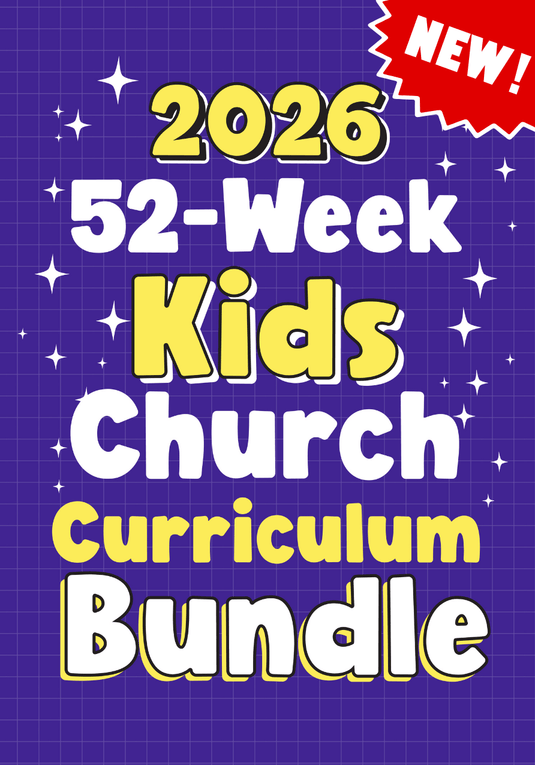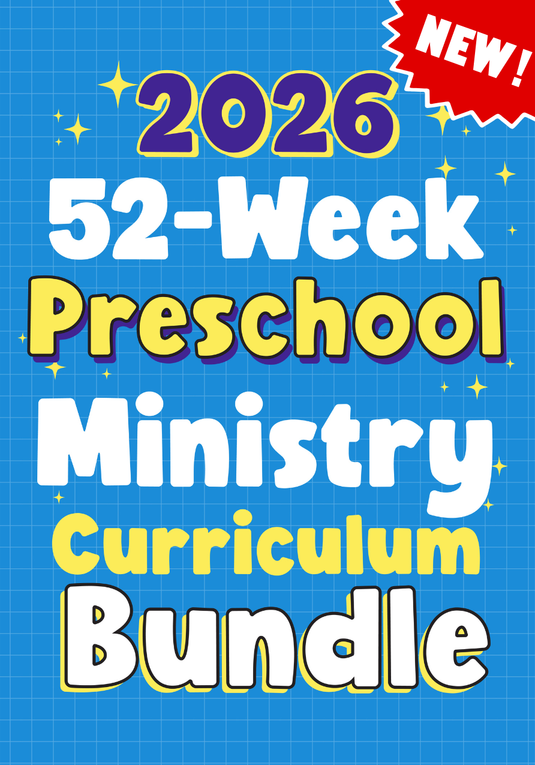We all enter our Sunday School hour with the best intentions. We know we will have a room full of kids who need to hear the Gospel truth that Jesus loves them, died for them, and they can have a relationship with Him today. We hope that the discussion is deep and the activities are fun. With all the good intentions, prayers, and hopes we have, the Sunday School hour can be total chaos if we aren’t intentional, careful, and prepared. Implement some of these ideas so your Sunday School lesson is all you hoped for, and more.
Even the most prepared lesson can lose track and can go off the rails at times and that is ok! Using these intentional strategies can help circumvent the possibility of negative chaos. Always start with the end in mind and a firm foundation. Prepare for interruptions, the pause, how you will stand to teach, time fillers, and the review portion of your lesson. Remember to try to infuse your lesson with engaging moments for all learners. And finally, give prayer a primary role in your preparation and during the lesson and see what God does! With these strategies, you will be in for a life-changing hour that is sure to stay on track.
1. Start with the end in mind. When preparing for the lesson, always make sure to know the end goal. What nugget of truth do you want the children to leave knowing? If your curriculum does not offer the objective or main point, make sure to write it out and make it the forefront of your preparation. You can also write it out on the board, print it out for the wall, or hand it to each kid individually as they leave. If you know what the end goal is, you are less likely to invoke chaos and get off track.
2. Create a firm foundation. When the kids enter your classroom or Sunday School area, what can they expect? Even though you may have visitors each week, those that have been with you all year need to have things they can expect. This can be as simple as the way you greet them, the opening activity, or when you put your prayer request time into the lesson. Incentives are a great way to help set your classroom up for success. Discipline is also included here so make sure to know your children’s ministry discipline policy. If they do not have one in place, begin to think about how to diffuse issues and make sure everyone is learning without distraction. All of these consistent details help create a firm foundation to guide your class time.
3. Prepare for interruptions. Even Jesus prepared for interruptions in His earthly ministry. As He would go to the next place, He was regularly interrupted. Jesus never diverted or evaded an interruption; he leaned in. Sometimes, the best conversations happen because of an interruption. Instead of getting flustered welcoming chaos, lean into interruptions and guide them to Gospel conversations. When the moment arises to tie the conversation or statement back to the main point of the lesson, do so in a loving way to get everything back on track. Sometimes the comments have nothing to do with the lesson. If that is the case, give yourself the freedom to invite that kid to share their story after the main lesson. Remember, each interruption has the potential to move into a Gospel conversation.
4. Stand and teach. So many times lessons go off the rails simply because classroom management is non-existent. You may have a classroom full of talkers, boy heavy, girl heavy, visitor heavy, friends, siblings, etc. No matter the makeup of your classroom, a key management tool is to simply stand. Setting yourself on a higher plane puts you as the authority in the classroom, allowing the kids to have an easy view of the teacher. If the kids sit on the floor, sitting in a chair is appropriate as well. Standing creates a more engaging atmosphere as well and allows you to see any social needs your kids may have.
5. Teach to all learners. This might be the hardest, but possibly the most reliable when it comes to making sure your lesson does not go off the rails. When preparing your lesson, think about all the learning types you may have in your classroom: visual, auditory, tactile, and kinesthetic. Try your best to provide times throughout your lesson where all learners can engage. You can use pictures and objects for visual learners. For auditory learners that learn best by hearing, talk in funny voices, or use repetition. Tactile learners learn best through touch and feel, so providing manipulatives or crafts will help them see the main point clearly. Finally, plan to get the kids up and moving through memory verse motions or acting out the Bible story for the kinesthetic learners in the room. Teaching to the various learning types will help everyone stay engaged and on track throughout your lesson.
6. Be ok with the pause. When you ask a question, be ok with a pause before the answer. As kids get older their processing speed may change so they may not be as quick to respond, especially to questions that contain abstract themes. If we are too quick to answer for our students in the classroom or lose track, things can quickly go off of the rails and kids will leave disinterested. Instead, give several seconds of a pause, even though it may be an awkward silence, for the child to answer or discuss.
7. Make prayer a priority. Sometimes we overlook the critical role of prayer in the preparation of our Sunday School lessons. This must be the first priority. When we enter our Sunday School hour prayed up, then we will be more grace-giving and full of Gospel focus when the inevitable issues arise. Instead of things going off the rails, you will have eyes to see what all God is doing throughout the lives of the kids and you throughout the hour.
8. Review, review, review. This is a great tool to remove the risk of chaos ensuing during your Sunday School hour. Review the lesson, main theme, memory verse, and any application points as a time filler, or plan it into your preparation for a smooth Sunday School experience. Review games can be as simple as a fun buzzer game, guessing missing words to the memory verse, or retelling the Bible story. Change it up by a different review item each month for extra fun!
9. Have time fillers in your back pocket. As stated earlier, a review is a great time filler. It is also a great idea to have other time-fillers ready on stand-by. If your lesson is short, or the craft did not take long, time fillers help your Sunday School hour stay on track. You can play a game of highs and lows, memory verse challenge games, Bible drills, paper airplane contests, scavenger hunts, etc. Get creative and have two or three always at the ready.
Even the most prepared lesson can lose track and can go off the rails at times and that is ok! Using these intentional strategies can help circumvent the possibility of negative chaos. Always start with the end in mind and a firm foundation. Prepare for interruptions, the pause, how you will stand to teach, time fillers, and the review portion of your lesson. Remember to try to infuse your lesson with engaging moments for all learners. And finally, give prayer a primary role in your preparation and during the lesson and see what God does! With these strategies, you will be in for a life-changing hour that is sure to stay on track.




